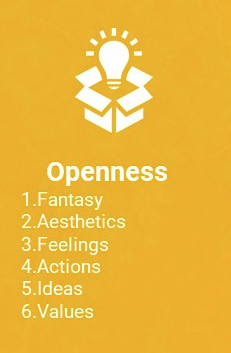Openness to Experience

Openness (or Openness to Experience) is one of the five dimensions of personality of the IPIP NEO Personality Inventory. It describes a dimension of cognitive style that distinguishes imaginative, creative people from down-to-earth, conventional people. Open people are intellectually curious, appreciative of art, and sensitive to beauty. They tend to be, compared to closed people, more aware of their feelings. They tend to think and act in individualistic and non-conforming ways. Intellectuals typically score high on Openness. Consequently, this factor has also been called Culture or Intellect. Nonetheless, Intellect is probably best regarded as one aspect of openness. Scores on Openness are only modestly related to years of education and scores on standard intelligent tests.
Another characteristic of the open cognitive style is a facility for thinking in symbols and abstractions far removed from concrete experience. Depending on the individual’s specific intellectual abilities, this symbolic cognition may take the form of mathematical, logical, or geometric thinking, artistic and metaphorical use of language, music composition or performance, or one of the many visual or performing arts. People with low scores on openness to experience tend to have narrow, common interests. They prefer the plain, straightforward, and obvious over the complex, ambiguous, and subtle. They may regard the arts and sciences with suspicion, regarding these endeavors as abstruse or of no practical use. Closed people prefer familiarity over novelty; they are conservative and resistant to change.
Psychologists, who are often themselves open to experience, often present Openness as healthier or more mature. However, open and closed styles of thinking are useful in different environments. The intellectual style of the open person may serve a professor well, but research has shown that closed thinking is related to superior job performance in police work, sales, and a number of service occupations.
Openness Score
Low Openness to Experience
Your score on Openness to Experience is low, indicating you like to think in plain and simple terms. Others describe you as down-to-earth, practical, and conservative.
Average Openness to Experience
Your score on Openness to Experience is average, indicating you enjoy tradition but are willing to try new things. Your thinking is neither simple nor complex. To others you appear to be a well-educated person but not an intellectual.
High Openness to Experience
Your score on Openness to Experience is high, indicating you enjoy novelty, variety, and change. You are curious, imaginative, and creative.
Openness Facets
- Imagination. To imaginative individuals, the real world is often too plain and ordinary. High scorers on this scale use fantasy as a way of creating a richer, more interesting world. Low scorers are on this scale are more oriented to facts than fantasy.
- Artistic Interests. High scorers on this scale love beauty, both in art and in nature. They become easily involved and absorbed in artistic and natural events. They are not necessarily artistically trained nor talented, although many will be. The defining features of this scale are interest in, and appreciation of natural and artificial beauty. Low scorers lack aesthetic sensitivity and interest in the arts.
- Emotionality. Persons high on Emotionality have good access to and awareness of their own feelings. Low scorers are less aware of their feelings and tend not to express their emotions openly.
- Adventurousness. High scorers on adventurousness are eager to try new activities, travel to foreign lands, and experience different things. They find familiarity and routine boring, and will take a new route home just because it is different. Low scorers tend to feel uncomfortable with change and prefer familiar routines.
- Intellect. Intellect and artistic interests are the two most important, central aspects of openness to experience. High scorers on Intellect love to play with ideas. They are open-minded to new and unusual ideas. Furthermore, they like to debate intellectual issues. They enjoy riddles, puzzles, and brain teasers. Low scorers on Intellect prefer dealing with either people or things rather than ideas. They regard intellectual exercises as a waste of time. Intellect should not be equated with intelligence. Intellect is an intellectual style, not an intellectual ability, although high scorers on Intellect score slightly higher than low-Intellect individuals on standardized intelligence tests.
- Liberalism. Psychological liberalism refers to a readiness to challenge authority, convention, and traditional values. In its most extreme form, psychological liberalism can even represent outright hostility toward rules, sympathy for law-breakers, and love of ambiguity, chaos, and disorder. Psychological conservatives prefer the security and stability brought by conformity to tradition. Psychological liberalism and conservatism are not identical to political affiliation, but certainly incline individuals toward certain political parties.
